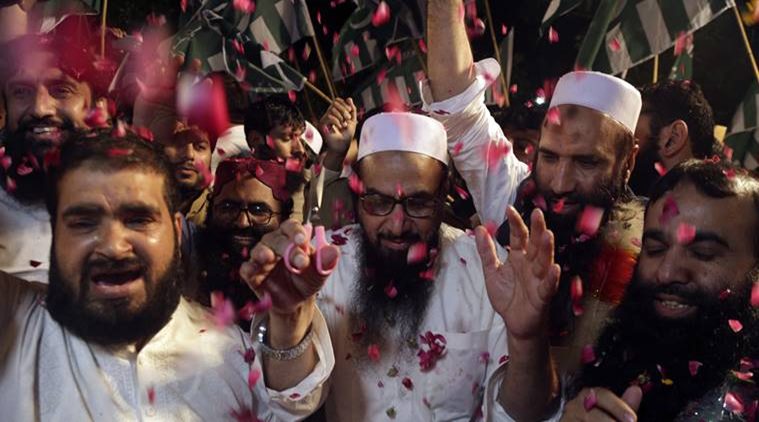
More than a week after it was rapped on the knuckles by global watchdog Financial Action Task Force (FATF), Pakistan Wednesday lodged 23 cases on charges of terror financing and facilitation against Jamaat-ud-Dawa (JuD) chief and 26/11 mastermind Hafiz Saeed and a dozen members of the terror group, as well as five banned outfits masquerading as charity organisations.
Pakistan’s Punjab Counter-Terrorism Department (CTD) said it registered the cases in Lahore, Gujranwala and Multan for collection of funds for terror-financing through assets or properties in the names of trusts or non-profit organisations.
“Large scale investigations launched into financing matters of proscribed organisations Jamaat-ud-Dawa & Lashkar-e-Taiba (LeT) in connection with the implementation of UN Sanctions against these Designated Entities & Persons as directed by NSC (National Security Committee) in its Meeting of 1st January 2019 chaired by the PM Imran Khan…,” the CTD said in a statement reported by local media.
Daily Times quoted CTD as saying that it registered the cases on July 1 and 2 against the leadership of JuD, LeT & FIF (Falah-i-Insaniyat Foundation) for gaining assets from terrorism financing through Dawat ul Irshad Trust, Muaz Bin Jabal Trust, Al-Anfaal Trust, Al Hamd Trust and Al Madina Foundation Trust.
Read | G-20 summit: No safe haven for economic offenders, says Osaka declaration
It also named the leaders of JuD and LeT who have been booked, including Saeed and his aides Abdul Rehman Makki, Malik Zafar Iqbal, Ameer Hamza, Muhammad Yahya Aziz, Muhammad Naeem, Mohsin Bilal, Abdul Raqeeb, Ahmad Daud, Muhammad Ayub, Abdullah Ubaid, Muhammad Ali and Abdul Ghaffar.
Pakistan’s move comes days after the G-20 declaration at the Osaka summit on June 28-29 gave primacy to the FATF’s “essential role” and called for the effective implementation of its standards.
On June 21, at the FATF plenary session in Orlando, the US — the terror financing watchdog’s chair — had told Pakistan that it could face blacklisting at its next session in October if it did not adhere to its commitments to stop access to funds for terror groups.
Pakistan’s CTD statement said: “Large scale investigations have been launched into matters of JuD, LeT & FIF regarding their holding & use of Trusts to raise funds for terrorism financing. They made these assets from funds of terrorism financing, they held & used these assets to raise more funds for further terrorism financing. Hence, they committed multiple offences of terrorism financing & money laundering under Anti-Terrorism Act 1997. They will be prosecuted in ATCs (Anti Terrorism Courts) for commission of these offences. These Assets/NPOs have already been taken over by the government in compliance with UN Sanctions.”
In March, Pakistan had put 44 “under-observation members of proscribed organisations” in “preventive detention” for investigation. The list included Mufti Abdul Raoof and Hamad Azhar who, Pakistan’s leading newspaper Dawn reported, were the brother and son of Jaish-e-Mohammad leader Masood Azhar. It had also re-instated a ban on JuD and FIF.
Also read | Pakistan must implement FATF action plan by September, says India
There was no official word from Delhi on the new set of actions taken by Islamabad. But sources said the MEA had put out a statement after the FATF meeting.
At the time, the Ministry of External Affairs had said that India expected Pakistan “to take all necessary steps to effectively implement the FATF Action Plan fully within the remaining time frame, that is, by September 2019, in accordance with its political commitment to the FATF and take credible, verifiable, irreversible and sustainable measures to address global concerns related to terrorism and terrorist financing emanating from any territory under its control.”
The FATF had deferred blacklisting of Pakistan, which managed to gain support from China, Turkey and Malaysia. And Pakistan said it remains committed to taking “all necessary measures to ensure completion of the Action Plan in a timely manner.” However, it accused India of attempting to “politicise” FATF deliberations.
This was after the cold shoulder from Prime Minister Narendra Modi for Pakistan PM Imran Khan in Bishkek in Kyrgyz Republic where both leaders attended the Shanghai Cooperation Organisation summit on June 13-14.
In New Delhi, sources viewed the developments with “caution”, and said similar action has been taken in the past without yielding results. “We do not want Pakistan to pretend that they are taking steps. Rather, we want credible and verifiable action against terrorists and terrorist groups,” they said.
Sources said Delhi does not want to see “words”, but in “naya (new) Pakistan, we want to see naya action”.
Last week, on the sidelines of the G-20 summit in Osaka, Modi, who pitched for a global conference on terrorism, had said: “Terror is the biggest threat to all of humanity. It not only takes the lives of innocent people, but it has a huge adverse effect on economic progress and social stability. We have to stop all means of support and help available to terrorism…”
In a joint statement, BRICS, which includes China, had called on all states to prevent financing of terrorist networks and terrorist actions from their territories.